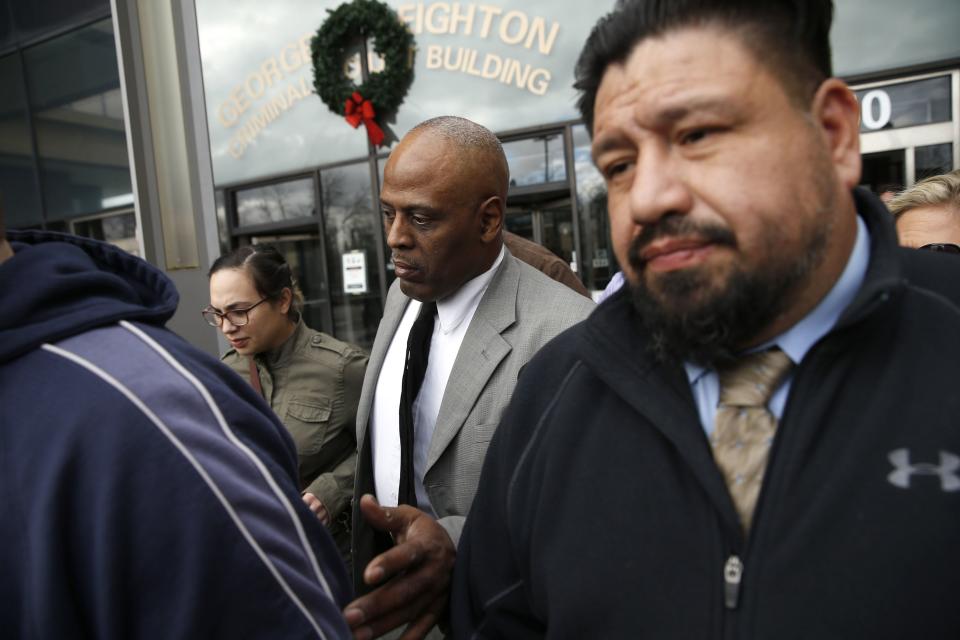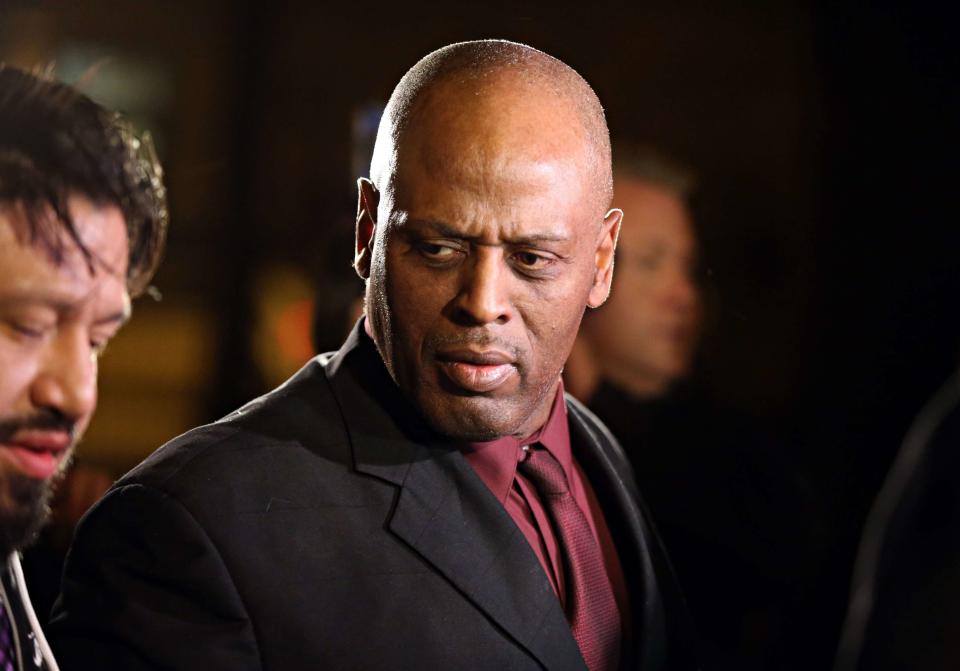City’s police accountability agency did not finish investigation against infamous cop, declines to wrap it up now
A city agency tapped to review police misconduct complaints failed to complete an investigation into a high-ranking Chicago cop several years ago and has declined to finish it now, according to documents obtained by the Tribune.
The Civilian Office of Police Accountability assigned an investigator in 2017 to determine whether Lt. Glenn Evans lied about allegedly breaking a mentally ill woman’s nose while she was in custody, but public records show the agency shelved the case almost immediately without any explanation — or any real inquiry.
The case saw little activity until earlier this year, when the city Office of the Inspector General reviewed the file as part of its routine oversight and recommended that COPA finish the investigation. The agency declined, saying it “would not be an efficient use” of its limited resources and that the Chicago Police Board would likely dismiss a sustained finding due to the passage of time.
The Tribune obtained more than 1,000 pages of records related to the case through Freedom of Information Act requests submitted to both COPA and the Office of the Inspector General. The public documents raise questions about COPA’s early accountability efforts, given the inspector general’s finding that no one seriously vetted allegations against a high-profile member of the Chicago Police Department command staff and that failure later was met with rejection.
“I am deeply concerned about what this sequence of events has to say about the robustness and effectiveness of the disciplinary system,” Inspector General Deborah Witzburg told the Tribune. “The allegations that Evans lied fell off of somebody’s desk, and then when that was raised to COPA’s attention, they said it wasn’t worth their time to go back to it. That is a troubling statement of affairs.”
COPA Chief Administrator Andrea Kersten, who never worked on the case but reviewed the inspector general’s recommendation earlier this year, acknowledged mistakes were made in the initial handling of the complaint. However, she said, the agency had concerns that it could not prove the case with the existing evidence, which was a decade old, and that renewing the investigation would violate Evans’ right to due process.
“I know what happens when an officer’s credibility is undermined. It undermines our entire system,” said Kersten, a former assistant Cook County state’s attorney. “If I thought there was a legal path forward to reopening this case and sufficient evidence to do so, that decision would have been made. It didn’t warrant it in this case.”
Neither Evans nor his attorney responded to requests for comment.
Evans, now 61, remains on active duty, but he has been stripped of his police powers and is assigned to desk duty, a CPD spokesperson said. City records show he is paid more than $150,000 annually.
Evans frequently had been praised by CPD leadership for his no-nonsense police style until 2014, when he was charged with felony battery and accused of placing the barrel of his gun into a suspect’s mouth. He was acquitted during a bench trial and later unsuccessfully sued the city for framing him.
He has faced more complaints than 99.8% of other officers during his 37-year career, according to data from the Invisible Institute. He has been the subject of 132 misconduct allegations, with 12 of them sustained, the data shows.
Among those sustained allegations is an incident that took place April 10, 2011, at the Gresham District (6th) lockup facility on the city’s South Side. Records show a woman with mental illness had been detained on domestic violence-related charges and was refusing to cooperate with the booking process, prompting an officer to call Evans for help.
“We’ll get somebody who knows how to get your fingerprints,” an officer said, according to a COPA report.
Evans came to the lock up a short time later and spoke with the woman, who told him that she had been diagnosed with a mental illness and was high on cocaine. Evans told investigators that the woman was “caterwauling” and behaving incoherently, fueling his desire to book her and release her as quickly as possible.
“We did not want to keep her in the lockup because there was a liability with it,” Evans told investigators, according to a transcript. “So we tried to get her up, process her and get her out as quick as we can because we do not want to put her in a lockup, especially for minor offenses like this, and keep them locked up for a prolonged period of time.”
At this point, the stories diverge.
The woman told investigators that Evans placed his open hand at the tip of her nose and pressed upward, causing excruciating pain, records show. He also threatened to put her “nose through (her) brain,” according to the woman’s statement.
“He didn’t say he wanted to kill me,” she said, according to the transcript. “But expressing he wanted to put my nose through my brain, that’s saying I’m gonna kill you.”
Evans told investigators he only touched the right side of the woman’s face and head. The contact, he said, was necessary because he was getting hit by her saliva when she screamed.
“So I had to grab her head at one point and actually grab her arm, grab her shoulder, grab her head and push her head away toward me and force her head towards the camera so she’d stop spitting in my face,” he told the investigator.
Evans also denied making that threat, and none of the officers present said they heard it.
Two officers, however, told investigators that Evans did place an open hand on the woman’s nose and applied pressure until she cooperated with her processing, according to the investigators’ findings. The woman quickly acquiesced after the compliance tactic and gave her fingerprints before being released, records show.
She filed a complaint against Evans the next day with the Independent Police Review Authority, the accountability agency that preceded COPA in handling misconduct complaints against cops.
The woman also went to a hospital, where she was diagnosed with a broken nose. The doctor, however, could not determine whether it was a recent break or an old injury, according to medical records reviewed by the Tribune.
In 2013, the woman filed a civil rights lawsuit against Evans — who had since been promoted to the rank of commander — and other officers involved in her booking process. The case was later settled for nearly $98,500 after Evans exercised his Fifth Amendment rights against self-incrimination during a deposition and refused to answer questions 128 times.
COPA sustained allegations in 2014 that Evans forcibly pressed his hand against the woman’s nose for an extended period of time and threatened her, records show. The investigator determined his “maltreatment” of the woman brought discredit to the Chicago Police Department and recommended Evans be suspended for 15 days.
However, then-Superintendent Eddie Johnson believed that “an increased penalty of a thirty-day suspension was more appropriate,” records show.
By the time Johnson weighed in on the matter, Evans already had been indicted and acquitted on charges that he stuck a gun into the mouth of a suspect named Rickey Williams, pressed a Taser to his groin and threatened to kill him in January 2013. A judge found the Williams trial testimony to be unreliable and said the man’s DNA found on Evans’ weapon was “of fleeting relevance or significance.”
Evans was demoted to lieutenant before the trial and assigned to the medical records division. He remained on desk duty after his acquittal, perhaps the stiffer punishment, given his reputation as an aggressive, hands-on boss who regularly worked with officers on the streets in some of Chicago’s worst neighborhoods.
The city hired an outside attorney to review the disagreement between Johnson and IPRA over Evans’ recommended suspension length. Records show the attorney asked IPRA to review whether Evans lied during the investigation into the woman’s broken nose.
In July 2016, IPRA served Evans with four additional allegations of making a false statement and notified him of the date he would be interviewed by investigators, records show. Evans’ attorney, however, told the agency that his client would not be available for several weeks, despite a department rule requiring him to answer questions.
According to documents in the investigative file, IPRA then accused Evans of impeding an investigation and scheduled an interview for July 26. There is no indication the interview took place, according to records obtained from the inspector general’s office.
Evans sued IPRA a short time later, accusing the agency of botching the investigations into his conduct and setting him up for criminal charges in the gun case. In light of the lawsuit, IPRA administrators sent the case involving the alleged false statements regarding the woman’s broken nose to the inspector general’s office for review as a precautionary measure.
The IG’s office declined to take over the case, records show. Evans’ lawsuit was later dismissed.
The case remained dormant until IPRA was rebranded as the Civilian Office of Police Accountability amid the fallout from the murder of Laquan McDonald, a Black teenager who was shot 16 times by a white Chicago police officer. Evans’ case was assigned to a COPA investigator during the 2017 transition, but records indicate nothing was done with the case.
Kersten told the Tribune the case was officially closed in 2019 and that the allegations involving the woman’s broken nose were sent to the Police Department for review, though the closure does not appear in the records released to the Tribune. By that time, it had been more than eight years since the initial complaint and COPA had limited options, given the statute of limitations and aging evidence, Kersten said.
The agency has instituted several reforms in recent years that would make it less likely for similar investigations to fall through the cracks, Kersten said.
“There are just a lot more guardrails in the way all of our cases are assigned, supervised and move through the system now than we had then,” Kersten said. “There was almost none of that at that time.”
In April 2023, the inspector general’s office asked Kersten, COPA’s chief administrator, to reopen the case and take “any necessary and available steps to address the false statement allegations with which Cmdr. Evans was served ... but apparently was never interviewed.”
Kersten responded two months later, saying the Police Board would likely dismiss the allegations because so much time had passed. She also stated that interviewing Evans would be difficult because it would depend on his ability to recall the rationale behind the level of force he used more a decade earlier.
“COPA has reviewed the information in (the inspector general’s letter) as well as the case file and has determined that reopening a twelve-year-old case with a limited chance of success would not be an efficient use of COPA’s limited resources,” Kersten wrote.
The response does not sit well with Witzburg, whose office has an oversight role with COPA and several other city agencies.
“The most troubling thing that happened here, from my perspective, is that this failure to pursue these alleged lies was brought to COPA’s attention and they declined to address because they don’t think it’s worth their time,” she said.
The Chicago Police Department served Evans with a 30-day suspension in November 2022 for allegedly breaking the woman’s nose more than a decade earlier, records show. Evans filed a grievance, putting punishment on hold until his appeal is complete.




